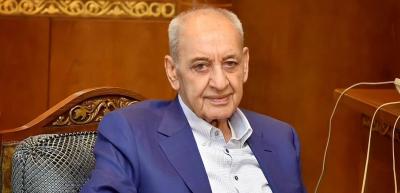On multiple fronts, Lebanese Parliament Speaker Nabih Berri is actively following developments in the ongoing confrontations between Hezbollah and the Israelis. He also closely monitors events in Gaza, describing Hamas's actions as a "heroic struggle unmatched in the world," highlighting that after more than eight months, they remain resilient and capable of striking Tel Aviv. He extends his greetings to "the Palestinian fighters who continue to resist Israeli aggression."
Berri is also engaged in internal Lebanese politics, aware that he holds all the keys to potential solutions. He seems certain that any serious resolution to the presidential crisis will hinge on his own proposal from about a year ago, which called for a seven-day dialogue session followed by open electoral sessions until a new president is elected. In an interview with the Kuwaiti newspaper "Al-Jarida," he asserts that without this approach, he does not see the possibility of ending the presidential vacuum regardless of ongoing efforts.
Regarding the "Quintet"—comprising the United States, France, Saudi Arabia, Egypt, and Qatar—Berri notes their commendable efforts concerning the presidential entitlement, while acknowledging some of his observations about their initial performance, which led to conflicting views among its members. However, he mentions that attempts were later made to correct and unify their positions. He recalls the content of the Quintet's latest statement, considering it problematic due to the deadline set for the end of the month for electing a president, questioning how this could be achieved given that the month has ended, and nobody has reached out to him to request a session for election or consult him on how to hold such a session. He anticipates the visit of French presidential envoy Jean-Yves Le Drian to Beirut tomorrow (Tuesday) and adds, "We must wait for Le Drian and what he carries with him."
Berri holds the Lebanese Forces, led by Samir Geagea, responsible for obstructing dialogue, believing that all other forces appear ready to engage, including the Free Patriotic Movement and its leader, Gibran Bassil. He bets on the Quintet to persuade all blocs and parties to participate in the dialogue, which he views as the sole entry point for a resolution. He insists on personally inviting to the dialogue—be it termed a dialogue, consultation, or discussion—on the condition that he presides over it, which he sees as non-negotiable.
On the possibility of holding a dialogue table outside Lebanon, such as in Paris, Berri remarked, "Why not hold it in Beirut, and in the Parliament?" Referring to speculations that the "Moderation Bloc" might call for "national consultation," he entirely denied it, stating, "I was the one who initiated the work of the Moderation Bloc and supported them to facilitate their work and communication among political forces and parliamentary blocs, but the matter of calling for dialogue is different."
Berri does not conceal his concerns about the situation in the south, asserting that confrontations are gradually escalating and emphasizing the need to reach a comprehensive ceasefire in Gaza; without that, escalation will continue and matters will head towards the worse. He does not fear the possibility of an extensive Israeli war or ground invasion of Lebanon, believing that the Israeli army is exhausted and unable to conclude its war in Gaza, hence will not be ready or capable of launching a war in Lebanon. "The Israelis know that if they want to repeat past experiences, they will face a major defeat, and when they think of entering Lebanon, Hezbollah and Amal Movement will act to counter them militarily."
Berri sees that Israel prefers to maintain the status quo, considering itself superior in air warfare and military technology, and therefore is unlikely to consider a ground operation. Despite Israel's military and air supremacy, Berri highlights that Hezbollah has managed to inflict significant blows on them. He views developments in the south as the entry point to all solutions in the country, just as halting military confrontations on the border relies on ending the war in Gaza.
When asked about U.S. envoy Amos Hochstein's movements, he said, "We remain committed to the agreement to move towards achieving an understanding for a ceasefire along with a cessation of fire in Gaza, after which the political process to implement Resolution 1701 will commence. Otherwise, the Americans know the situation will remain unchanged." He revealed that he received a U.S. call asking whether Hochstein could return to Beirut, to which his response was clear: "Everything is linked to stopping the war in Gaza, and as soon as military operations cease, Hochstein can come to discuss solutions."
He pointed out that risks certainly rise as long as the war continues and prolongs, especially since the Israelis employ a policy of systematic destruction and scorched earth over a distance of 7 km, thereby deliberately inflicting massive destructive losses in southern villages. He confirmed: "We have already begun working on preparing a plan for reconstruction and for people to return to their homes; I have asked the World Bank to provide the necessary funds for that, and I am working with Lebanese expatriates on the need for them to play a significant role in the reconstruction of the south. We will make appeals and requests to all neighboring and friendly countries, especially the Arab brothers, Saudi Arabia, Qatar, and Kuwait, for their contribution to the rebuilding efforts."




